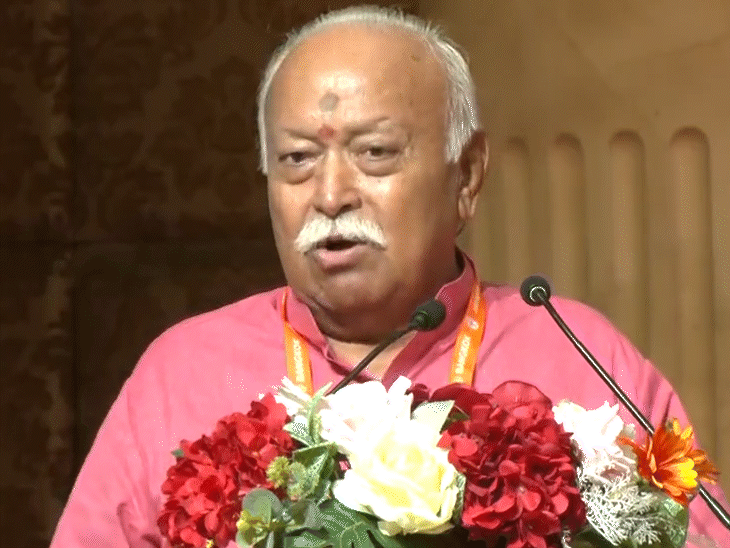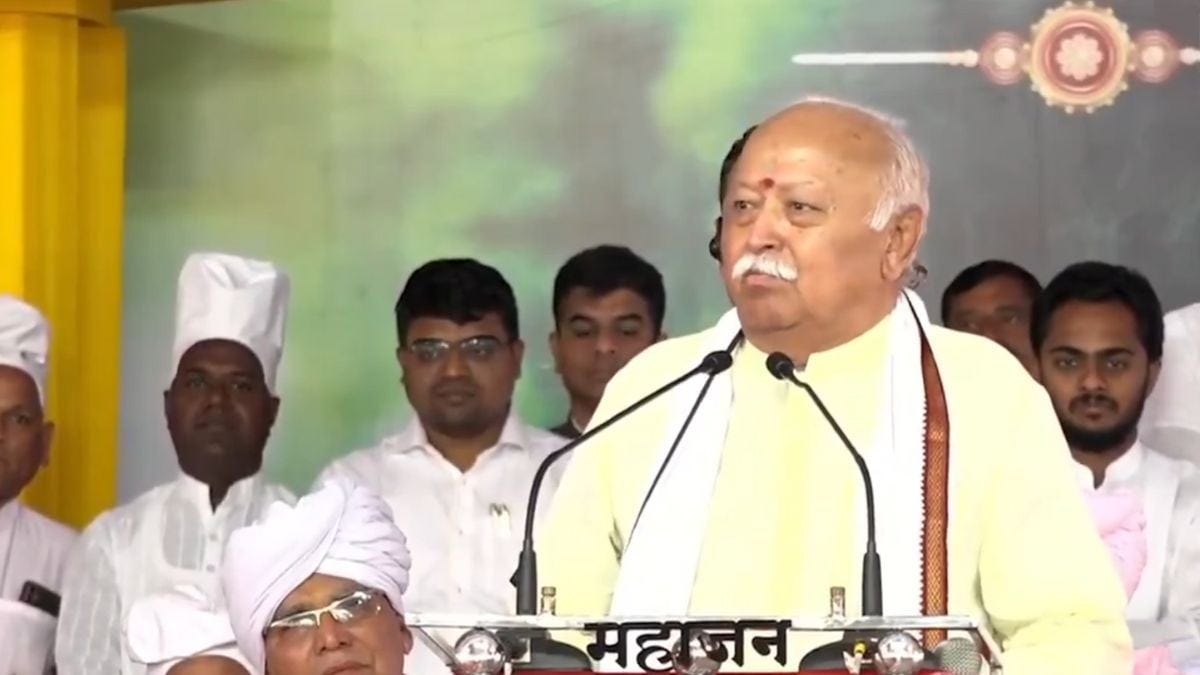RSS Chief’s December Speeches: Unity, Harmony, or Veiled Critique of PM Modi’s Policies?
Shri Mohan Bhagwat ji, as the RSS Sarsanghchalak, commands attention. Whether you love him or hate him, his influence, his words, and his vision cannot be ignored.
Mohan Bhagwat’s Vision for India: Bridging Faith and Harmony
In a series of impactful speeches delivered on various occasions, at different venues, and on distinct dates across Maharashtra in December 2024, Rashtriya Swayamsevak Sangh (RSS) Sarshanghchalak Mohan Bhagwat highlighted the urgent need for interfaith harmony, restraint in religious disputes, and a deeper understanding of inclusive values. His statements reflect a nuanced approach to leadership aimed at steering the RSS and Indian society toward unity and progress. These remarks have been variously interpreted as a thinly veiled attack on the stated and unstated policies of the ruling BJP, which is widely perceived as the political wing of the RSS, and by proxy, targeting Prime Minister Narendra Modi, who has emerged not only as the most powerful political personality in India but also as a de facto leader of the Hindu community worldwide.
Others, however, see this as a not-too-subtle signal to the BJP and PM Modi to moderate its stance against the Muslim community, which many sections of "secular" Hindus are increasingly uncomfortable with. Skeptics, however, view this as a "good cop, bad cop" contrivance by the RSS and BJP to beguile minorities in general and the Muslim community in particular.
Let us recap and summarize the salient points discussed, leaving it to our esteemed readers to draw their own informed inferences and conclusions.
December 19, 2024 – Pune: India as the Vishwaguru
At the event titled “India – The Vishwaguru” in Pune, Mohan Bhagwat addressed the resurgence of temple-mosque disputes and the implications for national unity.
He emphasized that the construction of the Ram Temple in Ayodhya is a matter of deep faith for Hindus and Indians but warned against using it to fuel divisive agendas.
Criticizing those who seek to create new disputes to gain leadership within the Hindu community, the RSS Chief remarked that such actions are "not acceptable."
Urging people to rise above hatred and enmity borne out of historical grievances, he called for abandoning the rhetoric of majority-minority dynamics and supremacy.
“India needs to show the world that it can live together harmoniously despite its diversity,” Mohan Bhagwat stated, positioning inclusivity as a hallmark of the nation’s identity.
December 20, 2024 – Pune: Hindu Sewa Mahotsav
At the Hindu Sewa Mahotsav, Bhagwat delved deeper into the ethos of “Sewa Dharma” (service as humanity’s eternal duty).
Highlighting service as transcending religious and social boundaries, he described it as fundamental to human well-being.
Linking the philosophy of service to the Ram Temple, he cautioned against its misuse for political gains, reiterating the temple’s spiritual significance rather than as a tool for power.
“Sewa Dharma is a universal value, uniting people across divides,” he said, urging Indians to prioritize compassion and collective welfare.
December 22, 2024 – Nagpur: The Inclusive Path
In Nagpur, RSS insiders interpreted Bhagwat’s remarks as a clear indication of the Sangh’s shift toward an inclusive and progressive outlook.
Reflecting on Bhagwat’s past statements urging restraint in religious controversies, such as the Gyanvapi mosque issue, insiders noted his consistent message of harmony.
Bhagwat reiterated that the RSS has no interest in launching new agitations after the Ram Janmabhoomi movement, signaling a departure from hardline stances.
His advocacy for women’s empowerment and challenges to caste discrimination were also highlighted as markers of this evolving vision.
December 23, 2024 – Amravati: Mahanubhav Ashram Centenary
Speaking at the Mahanubhav Ashram Shatakpurti Samaroh in Amravati, Mohan Bhagwat, the RSS supremo, addressed the profound importance of proper religious interpretation. Highlighting the consequences of misinterpretation, Bhagwat remarked, "There have been atrocities in the world due to misunderstanding of religion. It is necessary to have a society that interprets religion correctly. Religion is very important, it should be taught properly. Religion has to be understood; if it is not understood properly, then half-knowledge of religion will lead to 'Adharma.'"
Elaborating further, he warned of the dangers of incomplete understanding, stating, "Improper and incomplete knowledge of religion leads to 'Adharma.' All the oppression and atrocities happening in the world in the name of religion have happened due to misunderstandings about religion."
Reiterating his concern, Bhagwat emphasized, "Misunderstanding religion leads to atrocities and societal discord." He called for a deeper and more accurate understanding of religious teachings to ensure that religion becomes a force for good rather than division (video).
He encouraged leaders of various sects and communities to take the initiative in educating their followers about the true principles of their faiths. This, he stressed, would foster unity and peace, ensuring that religion serves as a unifying force rather than a cause for conflict.
A Holistic Approach to Leadership
Bhagwat’s speeches, across multiple platforms and occasions, underscore his vision of inclusive leadership:
He has consistently called for restraint in leveraging religious issues for divisive purposes.
His emphasis on interfaith harmony, women’s empowerment, and the rejection of caste hierarchies highlights the RSS’s evolving approach under his leadership.
The call for unity aligns with his broader goal of positioning India as a global exemplar of coexistence amid diversity.
India’s Path Forward: A Model of Harmony
Mohan Bhagwat envisions India as a beacon of peace, unity, and service, where differences are celebrated rather than contested. His statements urge a shift from rhetoric to action, advocating restraint, harmony, and a service-oriented approach to faith. As the country navigates its pluralistic identity, Bhagwat’s leadership reflects a transformative effort to align tradition with progress, inspiring India to lead by example on the global stage.
Concluding Thoughts: Love Him or Hate Him, You Cannot Ignore Him
In whatever way one may choose to interpret or decode Mohan Bhagwat’s speeches of December 2024, it must be noted that this is not the first time the RSS Sarsanghchalak has spoken in a candid and thought-provoking manner. His address at the World Hindu Congress in Bangkok last November stands as a case in point, offering a reflection on global Hindu identity and responsibility. Similarly, his remarks delivered barely a day after the Modi 3.0 Government was sworn in were seen by many as a subtle but pointed critique of Prime Minister Modi’s policies and leadership approach. Furthermore, his speech on the occasion of the Sthapana Diwas in October encapsulated the RSS’s universal philosophy of human welfare and inclusivity.
Even in his recent December speeches, Bhagwat’s underlying message consistently emphasized unity, peace, and harmony cutting across religious faiths and sects. On the surface, these ideals are universally commendable and devoid of divisive intent. However, political observers, ardent admirers of PM Modi, and hardliners within the Muslim community often view such speeches with skepticism, questioning whether they represent genuine inclusivity or a veiled strategy. Similarly, the Sikh community in Punjab remains cautious, often seeking clarity between the rhetoric and the reality of the RSS’s stance, particularly regarding its acknowledgment of Sikhism as a distinct religion from Hinduism—an acknowledgment expected despite the consonance of some teachings of the Sikh Gurus with the broader contours of Vedic philosophy.
Yet, irrespective of the controversies, suspicions, or differences in interpretation, one thing remains undeniable: Shri Mohan Bhagwat ji, as the RSS Sarsanghchalak, commands attention. Whether you love him or hate him, his influence, his words, and his vision cannot be ignored.







What he has said is not consistent with the aims of RSS as given on their own portal. Hindus are not dependent on Modi or Bhagwat or anyone else. In the today's time of social media, it is not possible to hide the truth. Historical wrongs must be undone. It is not a question of Hindus only. The matter goes beyond Hindu temples. We, as Indians, must reclaim our history, our culture which was devastated by invaders and covered by leftist historians like Romila Thapar (a master of ancient history with no knowledge of Sanskrit) an Irfan Habib (a master of medieval history with no knowledge of persian). Modi's failure to secure 400 in 2024 is a clear message that Hindus are in no mood of being made fool of now. Modi has, it seems, realized it. Bhagwat will realize soon. The swayamsevaks are not speaking publicly against Bhagwat's statement because of institutional discipline, but expect some action soon.